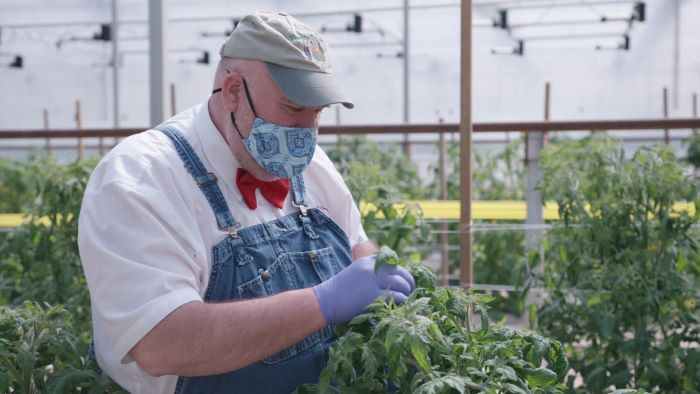In March 2020, as pandemic restrictions took hold and the country shut down, documentary filmmaker Laura Gabbert and noted food writer Ruth Reichl each embarked on separate documentary projects chronicling the economic impact the Covid crisis was inflicting on the independent food industry. Gabbert wanted to focus on the restaurant world, while Reichl was interested in how the larger food production system was affected. Joining forces, the two women have produced this earnest, enlightening, if overstuffed, film that addresses both areas.
“This is a disaster moment for the food system,” Reichl says to her friend and chef Alice Waters in a video chat from her cozy Hudson River Valley home. “We need to rethink everything from the ground up.” In a series of Zoom conversations, the author interviews a diverse range of chefs, bakers, restaurateurs, independent farmers, ranchers, and even an aquaculturist who farms kelp to gain insight into how they are surviving an unforeseen catastrophe.
Bay Area bakery owner and chef Reem Assil and Los Angeles chef Minh Phan try to think of ways to keep their employees working (takeout, delivery orders, and the occasional al fresco pop-up event). Due to the tight economics of the restaurant business, Phan wonders if she should switch to fine dining (you can charge higher prices) once the Covid restrictions ease. In Nebraska, corn and bean farmers Angela and Kerry Knuth convert their farm to certified organic production after years of unprofitable conventional agriculture. In Ohio, brothers Lee and Bob Jones, owners of the Chef’s Garden, face furloughing their workers after their restaurant clients shut down.
The businesses that thrive despite the pandemic’s challenges incorporate innovative and diverse cultivation techniques. On Long Island Sound, Bren Smith practices regenerative ocean farming, raising kelp and oysters, and teaches other ocean farmers his methods through his Greenwave organization. Georgia rancher Will Harris of the ecologically minded White Oak Pastures raises free-range livestock.
Reichl also examines the economic and social structural barriers that impact small operators: Kansas cattle rancher Steve Stratford, who is battling the market domination of the big four meatpackers, and Karen Washington, who resists Black agricultural disenfranchisement through her social justice-focused Rise & Root Farm.
To open up the documentary, Gabbert intersperses B-roll footage (shot remotely by one-to-two-person crews) between Reichl’s talking-head interviews, highlighting the cityscapes and landscapes where the interviewees work. She also incorporates archival film clips that accompany the brief narratives about the post-World War II industrialization of the American agricultural system and Reichl’s career as a food journalist, critic, and magazine editor.
The film ends in 2021 as the first Covid vaccine is released and the world starts to reopen, making Food and Country, coming out three years later, feel curiously dated. Although the end credits offer a brief follow-up on some participants (Bren Smith wins a major sustainability prize), there is surprisingly little exploration of how the food and restaurant industry has changed over the past four years. What lessons have been learned?
For viewers traumatized by a year of Zoom meetings, watching a series of video interviews does not make for compelling viewing. Indeed, the documentary has the feel of a dry, educational film shown to college classes. This is a shame because Gabbert and Reichl highlight dynamic, smart people who are working to repair our broken food system. In a way, this film would work better as a television series, with each episode devoted to more deeply profiling these remarkable food pioneers.

















Leave A Comment